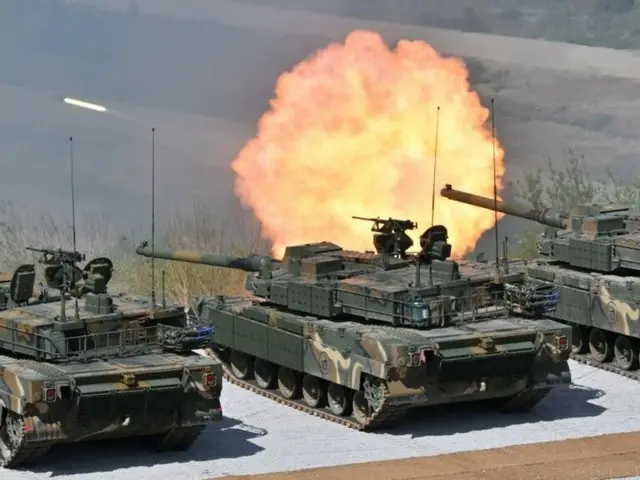This is because it has become On the 6th, the South Korean Ministry of Defense held a meeting with officials from five major banks at the Ministry of Defense building in Seoul to submit a letter of intent (LOI) regarding defense export financing support to Poland.
We talked about the conclusion. The meeting was attended by department heads and executives from five major banks (KB, Shinhan, Shinhan, Hana, Woori, and NH Agricultural Cooperative).
"The government and industry are working closely together to support defense exports to Poland," the ministry said.
He explained, ``This meeting was an opportunity for the Ministry of Defense and banks to discuss financial matters related to defense exports from multiple angles.'' At the meeting, two companies, including Hanwha Airspace and Hyundai Rotem,
A proposal for the five major banks to equally share the cost of arms exported to Poland was seen as a likely option. The size of the loan is estimated to be in the trillions of won, but the detailed amount and conditions have not yet been decided.
According to sources, the South Korean government and major banks are coordinating dates with the goal of announcing the contract on the 10th of this month. An industry official said, ``If private banks participate in financial support at the conference,
I have heard that an opinion has been presented that the fees that the government is ordered to pay should be lowered.''He added, ``In the future, it is unclear how private finance, which has less experience than national banks in the defense sector, will supplement its competitiveness.''
There was also an opinion that we should discuss it further." Meanwhile, South Korea signed a primary arms export contract with Poland last year worth a total of $12.4 billion (approximately 1,857.6 billion yen).
Following the conclusion of the basic contract in July last year, the first performance contract signed one month later included Korea Aerospace Industries (KAI), Hanwha Airspace, and Hyundai Rotem, among others.
The agreement includes providing RAND with $12.4 billion worth of weapons, including the FA50 light attack aircraft, K9 self-propelled artillery, Tenmu multiple rockets, and K2 Black Panther tanks.
After each company concludes the first contract, the remaining companies will conclude the second contract by the first half of this year, with a sense of speed.
The plan was to conclude. According to the basic contract, the expected number of K9 self-propelled guns in the second contract is 600, more than the first contract (48), and 82 K2 tanks, more than four times the number in the first contract (180).
0 units were planned, with an estimated cost of 30 trillion won. However, the implementation of secondary contracts has not been able to speed up. It has not been decided whether or not financial support will be provided by the Export-Import Bank of Korea, a national bank.
It's a good time. Usually, large-scale projects such as construction, transportation, and defense have strong characteristics of government-to-government contracts (G2G), and the scale of export is large, so export departure provides policy financing, guarantees, and insurance to the purchasing country.
This is an international custom. However, the current Export-Import Bank Law and Enforcement Order limit the amount of credit granted to specific individuals and corporations to 40% of the bank's own capital.
Considering that the Korea Export-Import Bank's equity capital is 18.4 trillion won as of the end of July, there is a large amount of export that can be supported by Poland.
The amount of financial support will be limited to 7.36 trillion won. The bank has already discussed a plan to invest 6 trillion won each with the Korea Export and Insurance Corporation to support the first performance contract.
Excluding this, the bank's ability to provide additional support to Poland remains at the level of 1.36 trillion won. Currently, the upper limit of the bank's legal capital has been increased from 15 trillion won to 30 trillion won.
An amendment bill has been proposed, but it has been pushed aside by other bills and is being held up without even being deliberated by the standing committee. In the Korean defense industry, this roundtable meeting between the Ministry of Defense and private banks has triggered
We hope that the company will move forward with the implementation of the secondary contract. An industry official said, ``The first priority is to quickly pass the amendment bill to the Export-Import Bank of Korea Act and ensure that defense exports are carried out through normal procedures.
If this is the case, I would like private banks to participate as a last-ditch measure.''He added, ``I hope that the contracts that have been signed so far will be executed quickly, as strong defense nations with strong competitiveness are strongly restraining the situation.''
2023/11/07 06:17 KST
Copyrights(C) Herald wowkorea.jp 104

